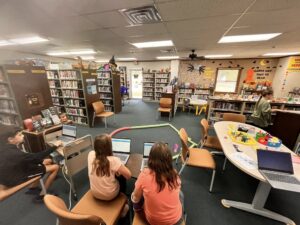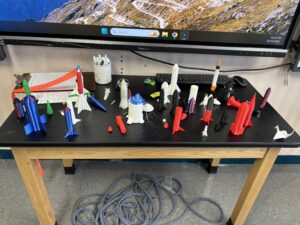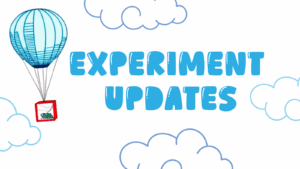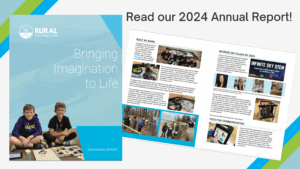I think it’s safe to say that this past year wasn’t what many of us expected it would be. Nearly every person was affected by the pandemic, and public education experienced a tremendous slate of new challenges. Every corner of the country had to figure out how to keep students learning while ensuring their safety and the well being of teachers and support staff. We have and are currently living through extraordinary times. But, we were able to do a lot of good work this year, have a lot to celebrate, and are geared up for an impactful 2021.
As always, I want to begin my yearly letter by thanking all the teachers, students, volunteers, donors, and community members for their support in our mission.
The Impact of COVID-19 on the RTF Mission
COVID-19 has impacted public education in countless ways, but there are two main areas where it limited the RTF’s mission to expand rural and high poverty access to computer science education: access to shared spaces and in-presence attendance.
One of the ways the RTF is able to reach so many students is by pursuing a shared resource model. For example, when we donate a robotics kit to a school we work with the school to place that kit in an area where multiple classes and grades have access to it, like the school library. This makes the equipment more accessible and provides significantly more opportunities for tech education exposure than if the equipment was isolated in a single classroom.
While this model has been critical to increasing rural access to computer science, COVID has limited access to these resources as schools seek to avoid cycling students in and out of common areas for safety.
At the same time, many kids simply aren’t physically in school as their districts rely on remote learning. Many of the resources we donate like robotics kits and 3D printers simply don’t scale to 1:1 access, which means they can’t be sent home with kids at a large scale. This has negatively impacted teacher requests for project funding and our ability to expand CS education to new classrooms.
Moving Forward
While this year has been challenging, I’ve seen several things that continue to inspire me. Many of the teachers we’ve worked with have gone above and beyond to continue CS education using limited resources. For example, one teacher in Pennsylvania set up a technology sharing program for her remote learning students. In this program, students took turns with available technology resources. She drove to the houses of some students every week to collect the items, sanitize them as necessary, and redistribute them to other students. Not only did this allow for continued learning, but it also allowed students who had already completed their projects to assist and teach other students. Another teacher in Iowa started a similar program, assigning micro:bit kits to ten students at a time before rotating them to other students. Her kids were thrilled to be able to take the technology home and explore how technology could bring their creativity to life.
While the RTFs ability to deliver education resources diminished, our wonderful donors showed up like never before. As reflected in our financial transparency report, this was our largest fundraising year yet. This was despite dramatic global economic impacts of the pandemic and our inability to do any in-person fundraising events for most of the year. With vaccine delivery ramping up all over the country, many experts expect in-person school to resume like normal in most places by the start of the new school year in the fall. We’re working closely with teachers to plan and execute new technology education programs in their schools. We anticipate project delivery will continue to be lower for the first half of this year, see a big surge in the summer and fall, and normalize to growth rates consistent with the past few years after that.
Financial Transparency
100% of the funds we raise go directly to support students. We don’t pay salaries and overhead is covered with direct support from the foundation’s board members. In that spirit, I’m glad to release this year’s financial transparency information.
Total Carried from 2019: $46,798.01
Total Raised in 2020: $113,468.86
- Direct Individual Support: $24,559.01
- Indirect Individual Support: $413.69
- Direct Corporate Support: $39,457.96
- Corporate Matched Funds: $35,414.76
- Board Member Contributions: $13,615.00
- Merchandise and Event Sales: $8.44
Total Spent in 2020: $65,070.79
- Scholarships: $1,000.00
- Classroom Donations: $48,383.23
- Library Donations: $15,000.00
- Misc Overhead / Marketing (Covered by Board Donation): $687.56
Total Carried Forward to 2021: $95,196.08
A New Achievement to Celebrate
The RTF is trying to make long-term investments in children and rural communities. To date, we’ve introduced over 133,000 students in all 50 states to computer science and STEM education. This strategy often makes it hard to measure our impact tangibly, but every now and then we are able to quantify the work we’ve done.
Currently, there are around 32,000 rural public schools in the United States. In our 12 years, the Rural Tech Fund has been responsible for helping bring the first computer science education programs to ~350 of them. That means the RTF has helped start CS ed programs in just over 1% of the rural schools in the country. That is an accomplishment I’m amazingly proud of considering the size of our organization. This shows the value of a clear mission, persistence, and connecting with passionate educators.
But, there’s still plenty of work to be done. As of 2020, only 43% of rural schools are teaching computer science.

We can’t reach our ambitious goal without your help. Please consider a one-time donation or a recurring donation through our Patreon page.
We’re also looking to grow our team! The RTF needs someone to help with marketing and periodic social media posts. If that’s something you’d be interested in helping with, please take a look at this job listing.
I’m proud of the work we’ve done so far. If you’d like to learn more about the RTF and our mission, I’d be glad to speak to you and your community group, in person or remotely, and tell you my story. Please don’t hesitate to reach out.
Thank you for all your support,
Chris Sanders, Director
Rural Technology Fund






